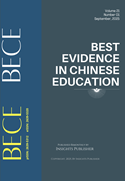Meritocracy in Education: Bridging or Widening Educational Inequality
##plugins.themes.bootstrap3.article.main##
##plugins.themes.bootstrap3.article.sidebar##
Abstract
Meritocracy emphasizes that reward for and advancement of the individuals should be based on their effort and talent. It finds a strong echo in the Chinese educational tradition, which places high value on the notion that “hard work pays off.” Nevertheless, in the context of the exacerbation of structural social inequalities, a sizable number of studies find that meritocracy, in practice, is unable to promote fairness, but instead obscures the issue of uneven distribution of education resources, further widening the disparities in educational opportunities between students with different socioeconomic status (SES). Based on data from the China Family Panel Studies (CFPS), this study is an empirical analysis of the effects of the meritocratic belief on access to educational opportunities in Chinese adolescents, as well as its heterogeneous effects among students with distinct SES backgrounds.
##plugins.themes.bootstrap3.article.details##

This work is licensed under a Creative Commons Attribution-NonCommercial 4.0 International License.

